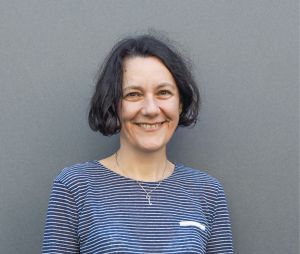Be it about having credits for previous coursework transferred at the beginning of one’s studies at the mdw, or receiving one’s academic degree at the end: all students, sooner or later, come into contact with the mdw’s director of studies. Since March of 2019, this post has been occupied by Ester Tomasi-Fumics, who pursues a broad spectrum of activities in this function. And in speaking with this energetic legal expert, who’s worked at the mdw since 2003, it quickly becomes clear: the wide-ranging responsibilities of the director of studies couldn’t be in better hands. Tomasi-Fumics also continues to be responsible for matters of curriculum development and legal aspects of studies at the Vice Rectorate for Academic Affairs and Young Artists‘ Promotion, an area in which she’s gathered extensive experience that is now proving useful in her new position.

It’s with infectious enthusiasm that Tomasi-Fumics sketches out her history at the mdw: in her initial job as a legal expert working for the Office of the Dean of Instrumental Studies, she got to know the area of curriculum development—“which is the area of my work that’s closest to my heart”. Beginning in 2004, she also took on responsibility for legal aspects of studies at the mdw—and “even so, I got bored,” recalls Tomasi-Fumics with a smile. So she then accepted an invitation to go abroad and work for the European Association of Conservatoires (AEC) in Utrecht, which was busy implementing the Bologna Process at universities of music. In doing so, Tomasi-Fumics became acquainted with a number of central questions and problems that places of university-level music education in various countries are currently facing: “How to position oneself as an institution? Where are music in general and training for classical music in particular headed? The high standards that apply in classical music are rising ever-higher. And the work itself is changing, calling for new skills that current training programmes don’t cover.”
To this day, she continues to benefit from her international contacts and experiences, says Tomasi-Fumics, who eventually returned to the mdw “with an urge to tackle things head-on”. Having drawn strength and conviction from her impressions of other European institutions, she began devoting herself more and more to curriculum development and advising: “And it was suddenly no longer boring—in fact, I always wanted to devote more time to it than I had.”
Director of Studies Tomasi-Fumics and her office are responsible not just for credit transfer and the recognition of qualifications, but also for leave approvals, academic degrees, individual courses of study, and sometimes for invalidating exam scores. Particularly when it comes to interpreting the laws that govern academic studies, arts universities enjoy numerous individual exceptions that, nonetheless, need to be formally defined. Tomasi-Fumics lists a few of these: “At the mdw-, we have lots of commission-evaluated exams, which are more the exception at other universities; we also design our curricula differently, and our entire situation is really a thing unto itself. The instruction we offer is highly interactive and provided individually or in small groups. So there’s lots of teaching going on, along with a battle for the students’ time because we can’t have them being absent, neither in individual lessons nor in orchestra rehearsals—both are important. These are problems that other universities, with their lectures and overfilled lecture halls, don’t really have.”
The major challenges to which Tomasi-Fumics is looking forward as she begins her term in office include working on exam culture. “Our processes are highly individual, so it’s difficult to lay down and monitor clearly defined standards. Amidst all the established exam traditions, however, it’s necessary—no matter how tough it may be—to make sure that everything can be relied upon to run according to procedures that are clearly defined.”
Her work, placed entirely in the service of artistic creativity and education, remains interesting: “I’m there for the film people to the same extent that I’m responsible for church music—even though these two fields could hardly be more different! And it would be impossible for a solitary director of studies to cover everything on their own. It’s only working together with my deputy Stefan Schön and the rest of my office that all this can be done. So I’m very glad that I’ve got such great people on my team.” Ester Tomasi-Fumics views her own responsibility as being that of developing and building, “but after that, things have to run on their own—so it has to be possible for other people to take up the reins.”

